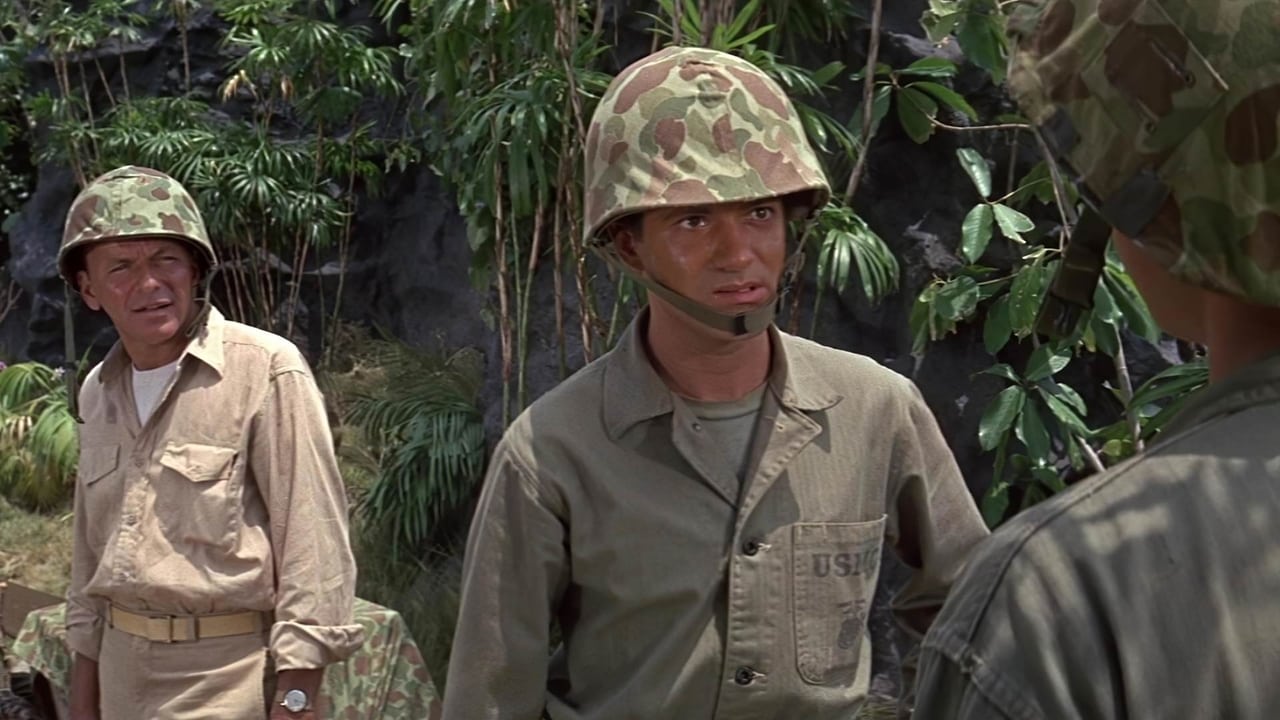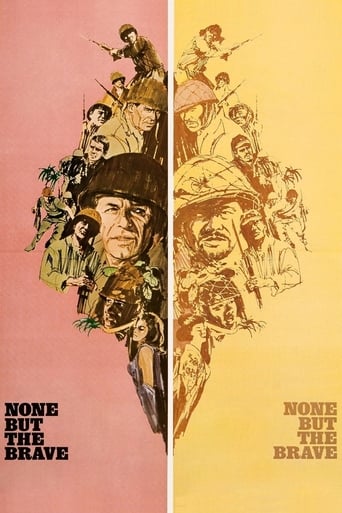

Purely Joyful Movie!
... View MoreLet's be realistic.
... View MoreIt's fun, it's light, [but] it has a hard time when its tries to get heavy.
... View MoreThe movie's neither hopeful in contrived ways, nor hopeless in different contrived ways. Somehow it manages to be wonderful
... View MoreI don't think None But the Brave is a classic, but it certainly is not a bad film. Not at all, even if the pacing is uneven, the score a bit of a disappointment(John Williams has done much better work before) and Tommy Sands's character written not as well as it could have been, there is still a lot to like. Asides from Sands, who does his best with his role, if overdoing it sometimes, the other acting is very good, with Clint Walker giving the best performance as he performs with care and sensitivity and the Japanese actors doing very well. This is one of the cases where Frank Sinatra did a better job as director than as an actor, while he is decent in a secondary role, I found his direction much more impressive. The scenery is very nice to look at, and the story is strong. Also abundant are the likable script and while the secondary characters are a little clichéd some care has gone into making them not seem so. Overall, not absolutely wonderful, but definitely not bad. 7/10 Bethany Cox
... View MoreDuring World War II, some United States marines crash-land on an island inhabited by a stranded platoon of Japan's finest. At first, the opposing cultures clash; but, due to their isolation, the fighting men learn commonalities - and, they assist each other, to survive. What will happen when the outside world intrudes? "None But the Brave" is, unfortunately, a very ordinary production. Frank Sinatra (as Mate Maloney) could be counted among the brave, for the film's somewhat daring thesis. Mr. Sinatra, who co-produced and directed, offers an unexpected point-of-view.Sinatra's boozing on-screen character is interesting because well, just because he's Frank Sinatra. In between swigs, Sinatra amputates a leg; that, and a bit of bad weather are the film's big dramatic moments The parallel scenes of the opposing cultures in flashback are a highlight. The Japanese, led by Tatsuya Mihashi (as Lieutenant Kuroki) outperform the Americans, led by Clint Walker (as Dennis Bourke). Sinatra son-in-law Tommy Sands (as Lieutenant Blair) clearly illustrates Sinatra's generosity; soon, Mr. Sands would discover the Chairman had around two categories for human relationships."None But the Brave" is too careless to be classic; but, it suggests Sinatra might have had an interesting and successful film directorial career, if he chose to focus on that particular credit. **** None But the Brave (2/24/65) Frank Sinatra ~ Frank Sinatra, Clint Walker, Tommy Sands, Tatsuya Mihashi
... View MoreOn a tiny forgotten island in the Pacific, there a tiny and forgotten Japanese outpost--with men who'd become stuck there with no great hope of rescue. Into this tiny place arrives a crashing airplane filled with US Marines. When they land, hostilities naturally break out between the groups. However, after a while they realize that killing each other will solve nothing and they have to work together to survive--forging an uneasy peace and friendship between enemy combatants.NONE BUT THE BRAVE is a film that is a real product of the times. Had anyone wanted to make such a film in the 1940s, they might just have been strung up for the film's very unusual sensibilities. Unlike older war films, in this one the Japanese are humanized a great deal and it's obvious that the film was made during the anti-war 60s (though early in the anti-war years). In many ways, this is a good thing--showing that people on both sides could be decent. Though in some ways the whole thing seemed a bit hard to believe--after all, very, very few Japanese officers would have admitted to not having faith in the war--this was a very 1960s sentiment.As for the acting, it was generally good. Clint Walker was clearly the star, though Frank Sinatra had a decent co-starring role in this film that he both produced and directed. The Japanese actors also were pretty good. The only weak point was the way Tommy Sands' character was written--he was like a one-dimensional caricature instead of a real soldier. No young lieutenant is THAT obnoxious and stupid!! Overall, an entertaining film but one that strains credibility, as the concept behind the film just doesn't make much sense for the 1940s. Still, if you can stop those voices in your head from complaining about the plot, it's a good and very different movie.
... View MoreIt's probably a mistake to say that this is Frank Sinatra's only effort at directing. Truth be told, starting with Ocean's 11, he directed about half the films he was in, whoever's name is in the credits was just a puppet. Frank was also producing as well, probably though he didn't want the public to get the idea he was Orson Welles.Maybe it would have taken an Orson Welles to have made None But the Brave a classic film, but Sinatra in his only formal effort at directing doesn't do a bad job except for his then son-in-law Tommy Sands. In fact he anticipates Clint Eastwood's Iwo Jima films by 40 years.This isn't Iwo Jima exactly, it's a small backwater island in the Pacific where a squad of Japanese soldiers have been cut off and are living off the land so to speak. A Navy transport plane is shot down with a squad of U.S. Marines on board. Pilot Clint Walker crash lands safely on that selfsame island and saves most of them, but they are also cut off. After a lot skirmishing mostly between Walker and Sands with Walker trying to prevent newly commissioned second lieutenant Sands from doing something stupid like charging the Japanese headlong, the two groups agree to opt out of World War II. An interesting thing happens, both find that they have a lot in common. We already know that in seeing the film from the Japanese point also with subtitles.The Japanese players are unknown to we occidentals for the most part, but I looked and found several like, Tatsuya Mihashi as the Japanese commander, Takeshi Kato as their sergeant, and Homere Suguro as the corporal who has his leg amputated by Frank Sinatra had substantial careers in Japanese cinema. The player on that side I liked most however was Ryucho Shunputei as the simple Japanese private who fishes and quite frankly is the key to their survival. I'm betting he wasn't exactly in the Samurai tradition in combat, but his skill at the profession he left behind is keeping his whole group alive.For himself Frank Sinatra took the part of a Navy Corpsman who is the only non-Marine beside Walker on the American side. The part fits him quite well indeed. This was the film where Brad Dexter who's the Marine sergeant in the film saved Frank Sinatra from drowning when old Blue Eyes was swimming and was nearly swept out to sea by the undertow. Bing Crosby's son Phil had a small role as one of the Marines, no doubt a favor from Old Blue Eyes to the Old Groaner.Frank Sinatra could be vindictive however and I had never thought about it before, but another reviewer's comments about Tommy Sands made me reconsider his performance. Maybe Frank was actually trying to mess his career up. Sands as the green second lieutenant is almost a caricature of one. He's so bad in the role, maybe it was lousy directing for him only.Other than that, Frank did not do a half bad job. It's not a great film, but it's not bad either and it does raise some interesting questions about people in combat situations.
... View More